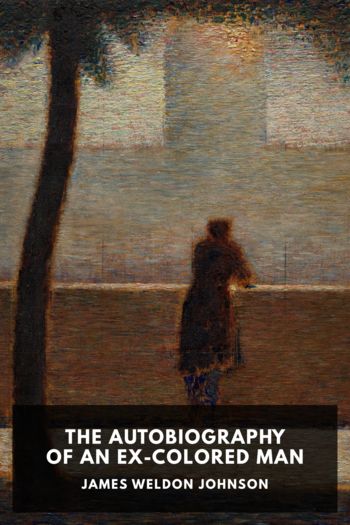The Autobiography of an Ex-Colored Man, James Weldon Johnson [best books to read in life .TXT] 📗

- Author: James Weldon Johnson
Book online «The Autobiography of an Ex-Colored Man, James Weldon Johnson [best books to read in life .TXT] 📗». Author James Weldon Johnson
Then I met her, and what I had regarded as a joke was gradually changed into the most serious question of my life. I first saw her at a musical which was given one evening at a house to which I was frequently invited. I did not notice her among the other guests before she came forward and sang two sad little songs. When she began, I was out in the hallway, where many of the men were gathered; but with the first few notes I crowded with others into the doorway to see who the singer was. When I saw the girl, the surprise which I had felt at the first sound of her voice was heightened; she was almost tall and quite slender, with lustrous yellow hair and eyes so blue as to appear almost black. She was as white as a lily, and she was dressed in white. Indeed, she seemed to me the most dazzlingly white thing I had ever seen. But it was not her delicate beauty which attracted me most; it was her voice, a voice which made one wonder how tones of such passionate color could come from so fragile a body.
I determined that when the program was over, I would seek an introduction to her; but at the moment, instead of being the easy man of the world, I became again the bashful boy of fourteen, and my courage failed me. I contented myself with hovering as near her as politeness would permit; near enough to hear her voice, which in conversation was low, yet thrilling, like the deeper middle tones of a flute. I watched the men gather round her talking and laughing in an easy manner, and wondered how it was possible for them to do it. But destiny, my special destiny, was at work. I was standing near, talking with affected gaiety to several young ladies, who, however, must have remarked my preoccupation; for my second sense of hearing was alert to what was being said by the group of which the girl in white was the center, when I heard her say: “I think his playing of Chopin is exquisite.” And one of my friends in the group replied: “You haven’t met him? Allow me—” Then turning to me, “Old man, when you have a moment I wish you to meet Miss ⸻.” I don’t know what she said to me or what I said to her. I can remember that I tried to be clever, and experienced a growing conviction that I was making myself appear more and more idiotic. I am certain, too, that, in spite of my Italian-like complexion, I was as red as a beet.
Instead of taking the car, I walked home. I needed the air and exercise as a sort of sedative. I am not sure whether my troubled condition of mind was due to the fact that I had been struck by love or to the feeling that I had made a bad impression upon her.
As the weeks went by, and when I had met her several more times, I came to know that I was seriously in love; and then began for me days of worry, for I had more than the usual doubts and fears of a young man in love to contend with.
Up to this time I had assumed and played my role as a white man with a certain degree of nonchalance, a carelessness as to the outcome, which made the whole thing more amusing to me than serious; but now I ceased to regard “being a white man” as a sort of practical joke. My acting had called for mere external effects. Now I began to doubt my ability to play the part. I watched her to see if she was scrutinizing me, to see if she was looking for anything in me which made me differ from the other men she knew. In place of an old inward feeling of superiority over many of my friends I began to doubt myself. I began even to wonder if I really was like the men I associated with; if there was not, after all, an indefinable something which marked a difference.
But, in spite of my doubts and timidity, my affair progressed, and I finally felt sufficiently encouraged to decide to ask her to marry me. Then began the hardest struggle of my life, whether to ask her to marry me under false colors or to tell her the whole truth. My sense of what was exigent made me feel there was no necessity of saying anything; but my inborn sense of honor rebelled at even indirect deception in this case. But however much I moralized on the question, I found it more and more difficult to reach the point of confession. The dread that I might lose her took possession of me each time I sought to speak, and rendered it impossible for me to do so. That moral courage requires more than physical courage is no mere poetic fancy. I am sure I should have found it easier to take the place of a gladiator, no matter how fierce the Numidian lion, than to tell that slender girl that I had Negro blood in my veins. The fact which I had at times wished





Comments (0)